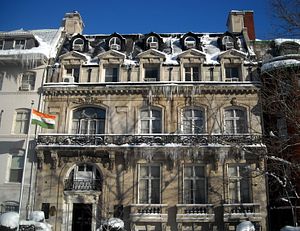Whether you call it a reaction or overreaction (or vengeance), India has initiated a number of reprisals against the United States after the arrest of an Indian diplomat in New York last week, thereby putting at stake friendly ties between the world’s two largest democracies. In a series of unprecedented measures, New Delhi scaled down security arrangements in front of the U.S. embassy in the national capital by removing barricades in addition to withdrawing the diplomatic identity cards given to U.S. consular staff and their families. Other steps taken include asking the U.S. embassy to submit the bank details of all Indian employees working at the American school and terminating the import duty waiver given to U.S. officials.
The unusually harsh steps were taken in response to the arrest of an Indian diplomat, Devyani Khobragade, last week in New York on the charges of visa fraud and underpaying her Indian maid. The 39-year-old Indian diplomat’s maid has complained that she was being paid less than what U.S. law stipulated, and what was declared on her visa forms.
Indian outrage stems more from the manner in which she was treated. Some reports suggest that she was handcuffed, strip-searched and kept in a cell with drug addicts. New Delhi argues that the United States violated the Article 41 of the Vienna Convention on Consular Relations which says that “a diplomat will only be arrested for a grave crime, and even if arrested, all courtesies will be extended to the diplomat.”
But Noel Clay, a spokesperson for the U.S. State Department retorts in an interview with India’s NDTV that “standard procedure” was followed in arresting Khobragade. The spokesperson was quoted as saying that “Under the Vienna Convention on Consular Relations, the Indian Deputy Consul General enjoys immunity from the jurisdiction of U.S. courts only with respect to acts performed in the exercise of consular functions.”
No one in India is willing to listen to the legal arguments. The issue has become sentimental and a matter of national pride. With general elections but a few months away, the subject has become a political issue, with politicians of all hues and color trying to invoke muscular nationalism.
Speaker of the Lower House of parliament Meira Kumar and National Security Advisor Shivshankar Menon refused to meet a visiting U.S. congressional delegation. Home Minister Sushil Kumar Shinde did the same thing. Political one-upmanship was on display on Tuesday when the ruling Congress Party’s Vice President Rahul Gandhi and the Opposition Bharatiya Janata Party’s prime ministerial candidate, Narendra Modi, canceled their meetings with the visiting U.S. dignitaries.
With parliament in session, the government does not want to look weak and the reactions therefore are not in proportion to the issue at hand. The diplomatic row gives the Congress-led ruling alliance in Delhi an opportunity to assert itself and appear in command – an opportunity to dispel the popular perception that the government is drifting and unable to make any firm decisions.
For the Hindu nationalist right-wing BJP, the main opposition, it is time to hit back at the U.S. administration over the denial of an American visa to its prime ministerial candidate Narendra Modi. Modi has been denied a visa since 2005 due to his alleged involvement in the killing of hundreds of Muslims in Gujarat in 2002. One of the senior leaders of the party, Yashwant Sinha,”demanded that the government take action against U.S. personnel in India having same-sex companions following the Supreme Court order against gay sex.”
The Indian media was agitated by the scandal as well. Time of India writes that “there are double standards at play here, as US authorities would not have flouted protocol similarly if the accused had been Chinese or British. For that matter, what would US reaction have been if their diplomats had been subjected to similar treatment abroad for alleged minor transgressions of local legislation?”
However, Indian Express does not appreciate “flag-raising theatrics.” In an editorial, the English daily writes that “to allow American pursuit of the rule of law on their territory to spiral into a diplomatic standoff speaks very poorly of India’s foreign service and the politicians and officials in Delhi [are] happy to play into notions of outraged national honor.”
The question arises: is the outraged reaction on the part of India justified? Does the whole episode reflect the sense of ennui that has crept into a flourishing India-U.S. relationship?
Resorting to sentimentalism will not help New Delhi hide the fact that it needs to resolve the festering issue of low payments to household help working with Indian officials overseas, sometimes violating local laws that stipulate a standard daily minimum wage for workers. By violating local law, how can diplomats claim immunity under international conventions?
The very fact that the issue, which could have been handled at the official level, has come to dominate the bilateral relationship between the two large democracies speaks volume about current state of engagement between New Delhi and Washington.
The Hindustan Times, in an editorial titled, “An Irritant India could do without” writes that “When there is little substance in bilateral ties, then small irritants like the latest one will set the tone… With India and the U.S. increasingly walking separate paths on Afghanistan and Pakistan, the economic and defense relationship stalled, and New Delhi uncertain about the direction of U.S. foreign policy in general, the two largest democracies are struggling with the big picture.”
In an election year, no one looks at the big picture. During the Cold War, anti-Americanism was a standard clarion call in seeking votes in India. The present agitation in India is a throwback to the past.

































